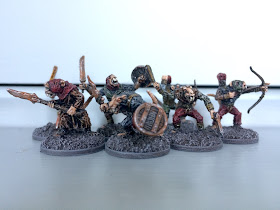... or at least that's my experience with them.
Why? Because even with the simplest, smartest or most intuitive rules, the system always -
always - gets forgotten in the heat of the game. Perhaps I'm an outlier here, but I've never known any group of players to adhere to encumbrance rules - or even to remember them. I've certainly never managed it as a player.
But I don't think it really matters as long as the GM asks one question whenever a physical challenge presents itself. That challenge might be crawling, climbing or combat, but the question should always be this:
what do you do with your stuff?
A central failing in many encumbrance systems is that they're trying to do two different jobs at once. Many systems grossly underestimate how much a strong, fit character should be able to carry in the wild for days on end. At the same time, they often overestimate how much the same character would be able to carry while still being unhindered in hand-to-hand combat.
The two situations are very different, so it's unsurprising that it's hard to cover them with a single system. How much stuff can determined travellers carry through the wilderness? Lots. How much stuff can those travellers keep about their persons and still fight unaffected? Very little? Hence the question:
what do you do with your stuff?
The answer will tend to be variants of "We discard some of it" (for climbing, crawling and the like) or "We dump it" (for fighting). So it leads to resource depletion in the first case and
an extra dimension to combat in the second. Each of these adds interest to the game.
If PCs discard some of their stuff, they're creating an obvious trail for anyone who might be following - unless they decide to conceal the abandoned gear. But if they do that, they're depleting both their resources and time. They might also be drawing predators to their trail if they abandon edible items (which might not be limited to food: remember the rust monster!).
And if they dump some of their stuff for a fight, they immediately create a more interesting tactical situation. The best RPG fights tend to resemble engrossing skirmish wargames, with much more to consider than merely rolling to hit. And, as any seasoned skirmish gamer knows, the best skirmish games tend to involve objectives beyond simply killing the enemy. A pile of hastily dropped supplies and loot immediately creates objectives for PCs and enemies alike. All of a sudden, manoeuvre, push-backs and retreats become much more important. And that's something that the GM should exploit to the full.










